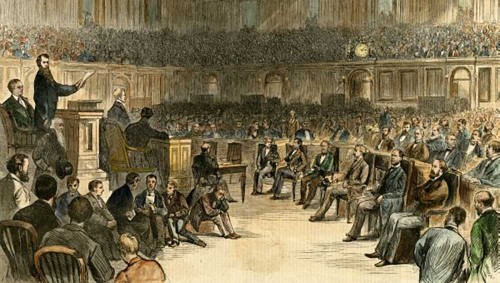Explore an in-depth, detailed profile of your representative, covering their educational background, professional experience, party affiliation, policy positions, views on key issues, achievements, controversies, advisors, donors, poll performance, foreign policy stance, endorsements, and voting record. Get informed and make an empowered choice with these AI prompts.
AI Prompt Series: Investigate Your Reps: Part 1, Part 2, Part 3, Part 4, Rep vs. Rep
Note: Simply replace POLITICIAN (below) with the name of the politician.
10 Prompts
Biographical Information:
Research and provide a detailed biography of POLITICIAN, including their full name, age, educational background, professional experience, political career, and any notable achievements or controversies.
Political Affiliation and Ideology:
Identify and analyze POLITICIAN's political party affiliation, ideological beliefs, voting record (if applicable), and alignment with major political movements or factions within their party.
Campaign Platform and Priorities:
Investigate and outline POLITICIAN's campaign platform, key policy priorities, and proposed solutions to major issues such as healthcare, education, economy, immigration, climate change, and social justice.
Campaign Funding and Support:
Explore POLITICIAN's campaign finance details, including sources of funding, major donors or contributors, fundraising strategies, and any financial disclosures or transparency measures implemented by the campaign.
Public Image and Perception:
Analyze public opinion polls, media coverage, and voter sentiment regarding POLITICIAN. Evaluate their public image, strengths, weaknesses, controversies, and how they are perceived by different demographics and political groups.
Debates and Public Speaking:
Assess POLITICIAN's performance in debates, public forums, and interviews. Evaluate their communication skills, ability to articulate ideas, handle challenging questions, and connect with diverse audiences.
Endorsements and Coalitions:
Identify and analyze endorsements received by POLITICIAN from political figures, organizations, interest groups, and community leaders. Evaluate the diversity and strength of their support base and any coalitions they have formed.
Campaign Strategy and Ground Game:
Research POLITICIAN's campaign strategy, ground game efforts, field operations, volunteer mobilization, digital outreach, advertising tactics, and engagement with grassroots activists and volunteers.
Campaign Promises vs. Feasibility:
Examine the feasibility and potential impact of POLITICIAN's campaign promises and proposals. Consider their practicality, legislative hurdles, budgetary implications, and the likelihood of implementation if elected.
Overall Assessment and Outlook:
Provide an overall assessment of POLITICIAN based on the research findings, highlighting their strengths, weaknesses, leadership qualities, policy expertise, electability factors, and the potential impact of their candidacy on the political landscape.
AI Image prompt: please create an image using classic symbolism of a private detective (e.g. magnifying glass) with a USA style red, white and blue color scheme in a 16:9 aspect ratio.
Explore in-depth, detailed profiles of politicians, covering their educational background, professional experience, party affiliation, policy positions, views on key issues, achievements, controversies, advisors, donors, poll performance, foreign policy stance, endorsements, and voting record. Get informed and make an empowered choice with these AI prompts.
AI Prompt Series: Investigate Your Reps: Part 1, Part 2, Part 3, Part 4, Rep vs. Rep
Note: Simply replace POLITICIAN (below) with the name of the politician.
One Big Prompt
Provide a comprehensive profile including educational background, professional experience, political party affiliation, key policy positions, views on all major issues (such as immigration, healthcare, economic policies, education policies, gun policies, climate change, and social issues), notable achievements, controversies or scandals, key advisors and campaign staff, major campaign donors, performance in the polls, stance on foreign policy, endorsements received, and voting record in previous political roles for POLITICIAN.
Individual Prompts
What is POLITICIAN's political party affiliation?
What is POLITICIAN's educational background?
What is POLITICIAN's professional experience prior to running for office?
What are POLITICIAN's key policy positions?
What are POLITICIAN's views on healthcare?
What are POLITICIAN's views on climate change and environmental policies?
What are POLITICIAN's views on economic policies and taxation?
What are POLITICIAN's views on immigration?
What are POLITICIAN's views on education policies?
What are POLITICIAN's views on gun control?
What are POLITICIAN's views on social issues (e.g., women's rights, racial equality)?
What are some notable achievements of POLITICIAN?
What controversies or scandals has POLITICIAN been involved in?
Who are POLITICIAN's key advisors and campaign staff?
Who are POLITICIAN's major campaign donors?
How does POLITICIAN perform in the polls?
What is POLITICIAN's stance on foreign policy?
What endorsements has POLITICIAN received?
What is POLITICIAN's voting record in previous political roles?
AI Image prompt: please create an image using classic symbolism of a private detective (e.g. magnifying glass) with a USA style red, white and blue color scheme in a 16:9 aspect ratio.
Explore the leading contenders from major parties and dive into detailed profiles of a specific presidential candidate. Discover their background, net worth, stance on key issues, and more. Stay informed as election season unfolds with these AI prompts.
Prompt
Who are the leading candidates from the Republican, Democratic, Independent, and third-party groups for the 2024 Presidential election in the US?
Prompt
Please help me gather comprehensive information about [CANDIDATE]. The information should be presented in a detailed bullet point list, covering the candidate’s age, party affiliation, employment background, estimated net worth in US dollars, their stance (pros and cons) and proposed policies on the top 20 current key issues (such as guns, immigration, domestic policy & economic growth, foreign policy, taxation, the national debt, education, civil rights, health care, and terrorism), campaign URL, and social media presence across major platforms (X, Facebook, Instagram, TikTok, etc.). [CANDIDATE] = Donald Trump
#Prompts #President #Elections
Image: White House, Washington. c1906. Stereograph showing the White House, garden of hyacinths in Lafayette Park in foreground. [link]
Discover the key differences between a primary, caucus, general election, and more. Learn how to participate, and understand their role in shaping the presidential race. Whether you’re curious about party nominations or the ultimate showdown in the general election, these AI prompts have you covered.
Note: Simply replace MYSTATE with the state you live in or wish to use as an example (where applicable).
Prompts
Please provide a simple explanation, suitable for a sixth grader, about the various types of primary elections in the US. These include closed, partially closed, partially open, open to unaffiliated voters, open, and multi-party. Please present this information as a bullet point list. After that, tell me what type of primary election is conducted in MYSTATE.
Please explain in a simple way what a caucus is and how it operates in the US.
Please explain in a simple way the difference between a caucus and a primary.
Please explain in a simple way how I participate in my state's caucus. I live in MYSTATE.
Please explain in a simple way how delegates are awarded in a US Presidential primary or caucus. How delegates are awarded include 1. Winner-Take-All, 2. Proportional, and 3. Winner-Take-Most. Show me an illustration of each way delegates are awarded. Tell me how delegates are awarded in MYSTATE.
Please explain in a simple way the difference between a primary or caucus, and the general election in the US?
Please explain in a simple way the difference between a primary, caucus and convention in the US.
Please explain in a simple way why if I don't vote in a US primary or caucus, I can still vote in November's general election.
Please explain in a simple way, and with a bullet point list of all the reasons (e.g. down ballot races and top-two primary winners in states like California), why a US primary still takes place with one candidate left in the race.
In this comprehensive AI prompt, we’ll unravel the mystery of the US Electoral College, explained in a simple, easy to understand way.
Electoral College Prompt
Explain the US Electoral College in a simple and concise manner suitable for a sixth grader, using analogies, specific historical events or elections, or simple examples where applicable. The explanation should include:
1. A brief history of why the Electoral College was established,
2. The difference between the popular vote and the electoral vote,
3. The functioning of the Electoral College,
4. The total number of electoral votes and the method of calculating this total,
5. The process of determining & distributing the number of votes each state receives in the Electoral College,
6. The number of electoral votes required to win a Presidential election and the reason for this specific number,
7. What happens if no candidate receives the necessary number of electoral votes,
8. How changes in population affect the number of electoral votes a state gets.
To illustrate the process of determining & distributing the number of votes each state receives, use the following state as an example: MYSTATE.
Note: Simply replace MYSTATE with the state you live in or wish to use as an example.
Copy This
Explain the US Electoral College in a simple and concise manner suitable for a sixth grader, using analogies, specific historical events or elections, or simple examples where applicable. The explanation should include: 1. A brief history of why the Electoral College was established, 2. The difference between the popular vote and the electoral vote, 3. The functioning of the Electoral College, 4. The total number of electoral votes and the method of calculating this total, 5. The process of determining & distributing the number of votes each state receives in the Electoral College, 6. The number of electoral votes required to win a Presidential election and the reason for this specific number, 7. What happens if no candidate receives the necessary number of electoral votes, 8. How changes in population affect the number of electoral votes a state gets. To illustrate the process of determining & distributing the number of votes each state receives, use the following state as an example: MYSTATE.
#Prompts #ElectoralCollege #President
Image: Counting the electoral vote - David Dudley Field objects to the vote of Florida. 1877. State Archives of Florida, Florida Memory. Accessed 3 Apr. 2024. [link]
Discover detailed information about your elected representatives, including their party affiliation, district, educational and employment backgrounds, net worth, terms served, awards, achievements, committee memberships, stance on key issues, voting records, official government URLs, campaign links, and social media profiles. Stay informed and engaged with this essential AI prompt resource.
AI Prompt Series: Investigate Your Reps: Part 1, Part 2, Part 3, Part 4, Rep vs. Rep
Prompt
Topic: Comprehensive information about all current federal (US Senate, US House of Representatives), state (State Senator, State Representative), and local representatives for [my zip code]. The information should be presented in a detailed bullet point list for each representative, including:
1. Age
2. Party Affiliation
3. The district they currently represent
4. Brief Educational Background
5. Brief Employment Background
6. Estimated Current Net worth (in US Dollars)
7. The number of terms they have served
8. The start and end dates for each of their previous terms
9. The start and end dates of the current term
10. Any upcoming elections they will be participating in
11. Any awards or honors they have received
12. Any notable achievements or contributions made by the representative
13. The committees they are part of
14. Their stance on key issues
15. Their voting record on key issues
16. Official Government URL in Member Directory
17. Campaign URL
18. Social Media Information (including all major platforms like Twitter, Facebook, Instagram, TikTok, etc.)
19. Their contact information (if publicly available)
[my zip code] = 33432
Copy This
Topic: Comprehensive information about all current federal (US Senate, US House of Representatives), state (State Senator, State Representative), and local representatives for [my zip code]. The information should be presented in a detailed bullet point list for each representative, including: 1. Age, 2. Party Affiliation, 3. The district they currently represent, 4. Brief Educational Background, 5. Brief Employment Background, 6. Estimated Current Net worth (in US Dollars), 7. The number of terms they have served, 8. The start and end dates for each of their previous terms, 9. The start and end dates of the current term, 10. Any upcoming elections they will be participating in, 11. Any awards or honors they have received, 12. Any notable achievements or contributions made by the representative, 13. The committees they are part of, 14. Their stance on key issues, 15. Their voting record on key issues, 16. Official Government URL in Member Directory, 17. Campaign URL, 18. Social Media Information (including all major platforms like Twitter, Facebook, Instagram, TikTok, etc.), and 19. Their contact information (if publicly available) [my zip code] = 33432
AI Image prompt: please create an image using classic symbolism of a private detective (e.g. magnifying glass) with a USA style red, white and blue color scheme in a 16:9 aspect ratio.
Discover the essential steps for participating in US elections. From registration to absentee voting, early voting, and more, these AI prompts empower you to make your voice heard. Whether you’re a student, a new resident, or an overseas citizen, these prompts simplify the process and ensure your vote counts.
Unlock Your Voice: Register, Vote, and Shape the Future.
Simply change MYSTATE (below) to the state you either live in or are interested in.
Prompts
What is the process for registering to vote in the MYSTATE?
What are the criteria that I need to meet to be eligible to vote in the MYSTATE?
What are the deadlines for voter registration in the MYSTATE?
How can I verify my voter registration status in the MYSTATE?
Can you provide information about absentee voting in the MYSTATE?
How does early voting work in the MYSTATE?
What forms of identification are required for voter registration in MYSTATE?
What forms of identification do I need to bring when I go to vote in MYSTATE?
What should students know about voting in MYSTATE?
How do I register to vote after moving to a new state, MYSTATE?
How can overseas citizens and military personnel vote in US elections in MYSTATE?
How can I request a mail-in ballot in MYSTATE?
What is provisional voting and when is it used in MYSTATE?
What provisions are there for voters with disabilities in MYSTATE?
Am I eligible to vote in the US if I have a criminal record?
Am I eligible to vote in the US while on parole or probation?
Can I cast my vote in the US while serving time in jail?
Discover key details about your state's legislature including how many representatives make up each body, the party breakdown of Democrats, Republicans, and other parties, vacant seats, term length, term limits (if any), annual salary, official URLs and member directory.
Prompt
For the state of [MY STATE] in the US, provide a bullet point list detailing the following for each of its state representative bodies (e.g., state senate, state house of representatives):
- Total number of members,
- Current number of members by party affiliation, including independent and third-party members, as well as the number of vacant seats,
- The most recent date when the member count was last updated,
- Term length for members: a) the length of a single term, and b) maximum possible term length (if term limits apply),
- Whether term limits apply (yes or no),
- Annual salary for a member,
- Official government URLs for the body: a) general website, and b) member directory.
[MY STATE] = Florida
Copy This
For the state of [MY STATE] in the US, provide a bullet point list detailing the following for each of its state representative bodies (e.g., state senate, state house of representatives): 1. Total number of members, 2. Current number of members by party affiliation, including independent and third-party members, as well as the number of vacant seats, 3. The most recent date when the member count was last updated, 4. Term length for members: a) the length of a single term, and b) maximum possible term length (if term limits apply), 5. Whether term limits apply (yes or no), 6. Annual salary for a member, 7. Official government URLs for the body: a) general website, and b) member directory. [MY STATE] = Florida
Image: Military map of the United States & territories showing the location of the military posts, arsenals, Navy Yards, & ports of entry. Compiled from pub-doc--1861. Published by P.S. Duval & Son 1861. [link]
The US House of Representatives is where laws are made. Each state has a voice in the House, but the number of representatives depends on the state’s population. Let’s explore how this works.
US House Info Prompt
Create a detailed bullet point list about the US House of Representatives, including the following information:
1. The total number of current members,
2. The current number of members broken down by party affiliation, including all parties, independent and third-party members, as well as the number of vacant seats,
3. The most recent date when the member count was last updated,
4. The term length for members, including both the length of a regular term and for special circumstances (e.g., filling a vacancy due to resignation, death, or expulsion),
5. Whether term limits apply, including if they apply to all members or only to certain positions (e.g., Speaker of the House),
6. The base salary of a US House member, plus additional compensation for each leadership role,
7. The official government URLs for both the House’s main website and the directory of current members.
Copy This
Create a detailed bullet point list about the US House of Representatives, including the following information: 1. The total number of current members, 2. The current number of members broken down by party affiliation, including all parties, independent and third-party members, as well as the number of vacant seats, 3. The most recent date when the member count was last updated, 4. The term length for members, including both the length of a regular term and for special circumstances (e.g., filling a vacancy due to resignation, death, or expulsion), 5. Whether term limits apply, including if they apply to all members or only to certain positions (e.g., Speaker of the House), 6. The base salary of a US House member, plus additional compensation for each leadership role, 7. The official government URLs for both the House’s main website and the directory of current members.
Why Different Number of Reps Per State Prompt
Imagine you’re explaining to a sixth grader. Write a simple and clear summary about how and why each state in the United States gets a different number of representatives in the US House of Representatives. Explain the concept of population representation and how it influences the number of representatives a state gets. Also, include information on how many representatives the user’s state, [MY STATE], currently has as of today's date. [MY STATE] = Florida
Image: Chamber House of Representatives [1865] [link]
Enter the fascinating world of the US Senate. From Senators to tie-breaking votes, we’ve got you covered. So, whether you’re curious about why 2 Senators per state or equal representation, the US Senate has all the answers. Dive in and become a Senate expert with these AI prompts.
US Senate Info Prompt
Topic: Comprehensive Information about the US Senate. The output should be a detailed bullet point list that includes:
- The total number of Senators currently serving,
- A breakdown of the current Senators by party affiliation, including all parties, independent and third-party Senators, and the number of vacant seats,
- The most recent date when the count of Senators was last updated,
- The term length for Senators, including the length of a regular term and the length under special circumstances (e.g., filling a vacancy due to resignation, death, or expulsion),
- Information on whether term limits apply, and if they apply to all Senators or only to certain positions (e.g., Senate Majority Leader),
- The base salary of a US Senator, along with additional compensation for each specific leadership role,
- The official government URLs for the US Senate’s main website and the directory of current US Senators.
Copy This
Topic: Comprehensive Information about the US Senate. The output should be a detailed bullet point list that includes: 1. The total number of Senators currently serving, 2. A breakdown of the current Senators by party affiliation, including all parties, independent and third-party Senators, and the number of vacant seats, 3. The most recent date when the count of Senators was last updated, 4. The term length for Senators, including the length of a regular term and the length under special circumstances (e.g., filling a vacancy due to resignation, death, or expulsion), 5. Information on whether term limits apply, and if they apply to all Senators or only to certain positions (e.g., Senate Majority Leader), 6. The base salary of a US Senator, along with additional compensation for each specific leadership role, 7. The official government URLs for the US Senate’s main website and the directory of current US Senators.
US Senate "Tie-Breaking Vote" Prompt
Imagine you’re in a classroom and your teacher asks the class to vote on whether to have a pop quiz. The votes are counted and it’s a tie! Now, who should break the tie? The teacher, right? Because they’re in charge of the class. Now, let’s think about the US Senate. It’s like the classroom, and the Senators are like the students. They vote on laws. But what happens if there’s a tie? That’s where the Vice President comes in. They’re like the teacher in our classroom scenario. So, explain why the Vice President of the United States is the person who gets to cast the tie-breaking vote when there’s a 50-50 tie in the Senate. Remember, explain it in a way that a sixth grader would understand!
US Senate "2 Senators Per State" Prompt
Imagine you’re playing a game with your friends. Some of your friends have more toys than others, but in this game, everyone gets an equal say, no matter how many toys they have. Now, think about the United States as a big group of friends, where each friend is a state. Some states have more people (like toys) than others. But when it comes to the Senate, every state gets the same number of Senators - that’s 2 each. So, can you explain why each state in the United States has exactly 2 Senators, no matter how big or small they are? Remember, explain it in a way that a sixth grader would understand!
Image: Senate chamber in the Capitol, Washington, D.C. [1901] [link]











